| Srl | Item |
| 1 |
ID:
130323
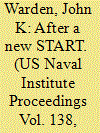

|
|
|
| 2 |
ID:
122350
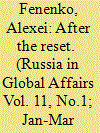

|
|
|
|
|
| Publication |
2013.
|
| Summary/Abstract |
The general environment of U.S.-Russian relations up to 2020 will remain conflict-prone, especially as Russia and the United States lack a complex of stabilizing economic ties, like those in U.S.-Chinese relations. The nuclear missile parity remains the sole stabilizer.
|
|
|
|
|
|
|
|
|
|
|
|
|
|
|
|
| 3 |
ID:
176620
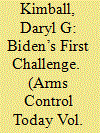

|
|
|
|
|
| Summary/Abstract |
Until the Trump era, every U.S. president since John Kennedy has successfully concluded at least one agreement with the Soviet Union, or later Russia, to reduce the dangers posed by nuclear weapons to the United States and the world.
|
|
|
|
|
|
|
|
|
|
|
|
|
|
|
|
| 4 |
ID:
174874
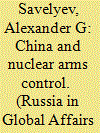

|
|
|
|
|
| Summary/Abstract |
Beijing explains its firm unwillingness to join the United States and Russia in nuclear arms control talks by the fact that China’s nuclear arsenal is incomparable with respective potentials of the world’s two leading nuclear powers. China urges Russia and the U.S. to go ahead with the nuclear disarmament process on a bilateral basis, and promises it will be prepared to consider the possibility of its participation in the negotiations only when its counterparts have downgraded their arsenals approximately to China’s level. Washington finds this totally unacceptable and demands that China either join the existing Russian-U.S. strategic New START treaty right away or agree to enter into a trilateral nuclear arms control format. This article studies the prospects of China’s involvement in nuclear arms talks and analyzes the true reasons behind Beijing’s desire to avoid any nuclear disarmament deals at this point. The working hypothesis of this paper is that China’s stance on the above issue is by no means far-fetched or propagandistic, and that it is driven by fundamental political, military and strategic considerations. Disregard for this factor and further forceful efforts to bring China to the negotiating table to discuss nuclear arms control will lead to failure.
|
|
|
|
|
|
|
|
|
|
|
|
|
|
|
|
| 5 |
ID:
119013
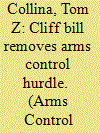

|
|
|
| 6 |
ID:
153463
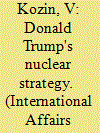

|
|
|
|
|
| Summary/Abstract |
U.S. PRESIDENT DONALD TRUMP has inherited large strategic and tactical nuclear arsenals from his predecessor, Barack Obama, and a strategy of "unconditional offensive nuclear deterrence," which allows for the possibility of a preemptive nuclear strike against practically any country that is not an ally, friend or partner of the United States.
|
|
|
|
|
|
|
|
|
|
|
|
|
|
|
|
| 7 |
ID:
173872
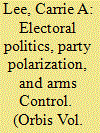

|
|
|
| 8 |
ID:
111881


|
|
|
|
|
| Publication |
2012.
|
| Summary/Abstract |
Conventional wisdom seems to hold that under Barack Obama, the US ballistic missile defence programme has been pushed aside to allow for a refreshed domestic and international agenda. Proponents point to Obama's campaign thinking and rhetoric, the ballistic missile defence (BMD) budget cuts, the decision to end the Third Site in Europe, and the reset relations with Russia through the New Strategic Arms Reduction Treaty (New START) as evidence that the programme has undergone a significant period of change, retraction and rationalisation. This article argues instead that BMD has not fallen from prominence and that there is a change in focus rather than retraction of its strategic goal. Consequently, BMD continues to grow in importance as a component of US national security strategy.
|
|
|
|
|
|
|
|
|
|
|
|
|
|
|
|
| 9 |
ID:
123547
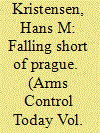

|
|
|
| 10 |
ID:
107354


|
|
|
| 11 |
ID:
128978
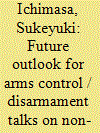

|
|
|
|
|
| Publication |
2013.
|
| Summary/Abstract |
Following the ratification of the New Strategic Arms Reduction Treaty (New START), the U.S.
Obama administration has shown enthusiasm towards the inclusion of non-strategic nuclear
forces - arsenals that were unaddressed in past nuclear arms control treaties between the two
countries - into the agenda of talks with Russia. However, non-strategic nuclear forces have
played different roles in each country, militarily and politically. For the U.S., the military value
of non-strategic nuclear forces has been declining. Their significance is becoming increasingly
difficult to discern, except for demonstrating commitment to visible extended deterrence to U.S.
allies. NATO, on the other hand, has stated in the 2012 Deterrence and Defense Posture Review
that it would explore reciprocal reductions of non-strategic nuclear forces with Russia, and as a
nuclear alliance, reaffirmed the deterrent role of non-strategic nuclear forces. By contrast, Russia
continues to attach importance to the role of non-strategic nuclear forces as an important element
of deterrence, and has expressed growing wariness over the development of U.S.'s ballistic missile
defense systems and conventional prompt global strike (CPGS) capability. The outlook for U.S.-
Russian arms control and disarmament of non-strategic nuclear forces is by no means promising.
Accordingly, it is imperative that U.S., Russia, and NATO continue to hold strategic dialogues
and build trust if reductions of non-strategic nuclear forces are to take place. The U.S. initiative
to reduce nuclear forces is particularly key. Critical tasks ahead will be the development of a new
common understanding between the U.S. and its allies regarding strategic stability and the role of
nuclear forces in deterrence, in addition to a shared understanding on the qualitative changes of the
threats facing the U.S. and Russia, respectively.
|
|
|
|
|
|
|
|
|
|
|
|
|
|
|
|
| 12 |
ID:
115808
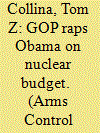

|
|
|
| 13 |
ID:
127565
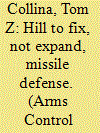

|
|
|
| 14 |
ID:
166083
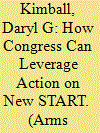

|
|
|
|
|
| Summary/Abstract |
Every U.S. president since John Kennedy has successfully concluded at least one agreement with Russia or the Soviet Union to reduce nuclear dangers. These agreements have helped to slash nuclear stockpiles, manage nuclear competition, and provide greater stability, thereby reducing the risk of nuclear catastrophe between the world’s two largest nuclear actors.
|
|
|
|
|
|
|
|
|
|
|
|
|
|
|
|
| 15 |
ID:
192452


|
|
|
|
|
| Summary/Abstract |
The American response is all but a model of diplomatic manners compared to NATO's document. NATO sent us such an ideologically motivated answer, it is so permeated with its exceptional role and special mission, that I even felt a bit embarrassed for whoever wrote these texts
|
|
|
|
|
|
|
|
|
|
|
|
|
|
|
|
| 16 |
ID:
188505
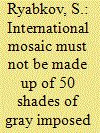

|
|
|
|
|
| Summary/Abstract |
Armen Oganesyan, Editor-in-Chief, International Affairs: Sergey Alekseyevich [Ryabkov], do you see in the near future a world split into two camps: the West vs. the non-West? It seems that world politics is moving toward a state of confrontation and a searching for partners for each center of power. In this regard, what model of international relations is Russia offering the world today?
|
|
|
|
|
|
|
|
|
|
|
|
|
|
|
|
| 17 |
ID:
115754
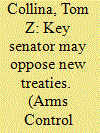

|
|
|
| 18 |
ID:
123548


|
|
|
| 19 |
ID:
111885
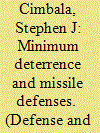

|
|
|
|
|
| Publication |
2012.
|
| Summary/Abstract |
Minimum deterrence is a compromise, or halfway house, between nuclear abolition or nearly zero and assured destruction, the dominant paradigm for strategic nuclear arms control during and after the cold war. Minimum deterrence as applied to the current relationship between the United States and Russia would require downsizing the numbers of operationally deployed long-range nuclear weapons to 1000, or fewer, on each side. More drastic bilateral Russian-American reductions would require the cooperation of other nuclear weapons states in making proportional reductions in their own arsenals. In addition, US plans for European-based and global missile defenses cause considerable angst in Russia and threaten to derail the Obama "reset" in Russian-American relations, despite the uncertainties about current and plausible future performances of missile defense technologies.
|
|
|
|
|
|
|
|
|
|
|
|
|
|
|
|
| 20 |
ID:
122941
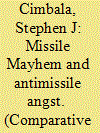

|
|
|
|
|
| Publication |
2013.
|
| Summary/Abstract |
The political context for nuclear arms reductions, as between the United States and Russia, seemed to stall in 2012 and appeared uncertain as to possible progress during the second term of U.S. President Barack Obama and the third term of Russian President Vladimir Putin. The prospect of a successor agreement to New START that would reduce the numbers of U.S.- and Russian-deployed strategic nuclear weapons to even lower levels was further clouded by Russian objections to U.S. and NATO plans to deploy missile defenses in Europe. The present study considers the political and military aspects of some prospective Obama approaches to post-New START nuclear arms reductions and performs pertinent analysis to consider the relationship between offensive nuclear arms reductions and missile defenses going forward.
|
|
|
|
|
|
|
|
|
|
|
|
|
|
|
|